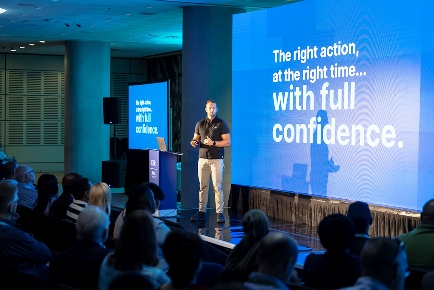Qlik®, a global leader in data integration, quality, analytics and artificial intelligence (AI), continued its global Qlik AI Reality Tour recently in Johannesburg, representing the Africa leg of this acclaimed annual series of business presentations to an audience of C-Suite executives and AI decision makers.
RELATED: Qlik identifies key trends to shape AI economy that will separate leaders from laggards
“Last year’s discussion addressed AI hype; this year it’s about real-world execution,” noted Tejas Mehta, Qlik Senior Vice President and General Manager, Middle East and Africa, in his introductory remarks.
“Data foundations are critical, and without them AI remains ineffective, and indeed is just a buzzword.”
Mehta added that business leaders must play a crucial role in bridging strategy and execution, with an emphasis on trust, speed and scale as enablers of business outcomes.
Generative AI has exploded
“Generative AI has exploded in a very short time, and business everywhere are asking how they can use it responsibly and with impact,” he explained. “To bridge the gap between strategy and execution, it is critical to embed the AI where the decisions are being made. This in turn will empower teams with a tool that they can trust, allowing them to act quickly while still staying in control.”
Following on from Mehta’s introduction, a number of presentations followed from senior Qlik executives, together with customers and partners, sharing perspectives on how Qlik is helping customers to bridge the critical gap between AI strategy and execution to realise business value.
‘Do Data Differently’
The first set of speakers included Kyle Jourdan, Qlik Head of AI Practice; Walid Wehbi, Qlik Principal Solutions Architect; and Noman Latif, Qlik Master Principal Solutions Architect, who joined forces to discuss how to ‘Do Data Differently’, including live demonstrations from Wehbi and Latif.
“The market is constantly changing; indeed, faster than ever,” said Jourdan. “Data has the power to give you the leverage to adapt and be more competitive. Qlik’s generative AI product offerings will make unstructured data more accessible to your users.”
Jourdan clarified that, according to the IDC (2025), 89 percent of organisations surveyed had added AI to their business strategy, but only 26 percent of those surveyed had actually deployed it within the business.
How to use AI at scale
“Another issue is how to use AI at scale,” he added. “According to Qlik CEO Mike Capone, the AI race will be won by embedding AI into business systems to generate tangible economic value – and this is precisely what Qlik has done. We have committed ourselves to turning data into business value based on the three pillars of trust, efficiency and natural language.
“You can’t move speedily with your data if you don’t trust it, while the Qlik analytics engine makes it possible to put AI on top of the data that you already have, to pull the answers out of the engine and put it into the hands of your users in order to realise value from their strategy.”
Jourdan also introduced the topic of ‘agentic AI’, which, he explains, is the next step in Qlik’s AI offerings, and which has been in the pipeline for the past few months. “This is the future that we are working towards,” he clarified, “with 80 percent of the companies that we’ve spoken to now investing in agentic AI workflow.
“We have a suite of tools that will fundamentally change the way that we work with data by being able to unify both structured and unstructured data analytics. By bridging this gap, Qlik’s agentic AI can make decisions, plan actions, and learn from its experience.”
Panel Discussion on Local Data, Cloud and AI Realities
Following on from the ‘Do Data Differently’ section of the programme with Jourdan, Wehbi and Latif, a panel discussion took place on the theme of ‘Navigating Data, Cloud and AI in South Africa: Challenges, Choices, and Real Impact’.
Panellists included Tuna Yemisci, Qlik Regional Sales Director; Charlene Anup, AWS Customer Solution Leader; Edward Bothma, inTrade Africa Group Chief Product and Technology Officer; Ashlin Ramkhelawan, Accenture Decision Science Manager; and Supriya Das, Redington Vice President – Data & AI, Middle East and Africa.
The panellists agreed that businesses must take time to understand their data; that partner ecosystems and skills development are critical to success; and that fast, reliable, future-proof investments are essential as the world continues with its rapid changes.
Customer Stories and Demos
Delegates were then introduced to a succession of customer stories and demonstrations, as follows:
- Huge TNS, a leading South African telecoms company, transformed the way it works with data by moving to Qlik Cloud, thereby enjoying measurable business benefits, and being empowered to make faster, smarter decisions with a modern data platform.
- One of South Africa’s largest retailers, Woolworths, has transformed the way the company uses data – specifically on the Woolworths Food side – over a seven-year journey with Qlik, with advanced analytics, loyalty insights and promotional ROI measurement turning complex data into actionable intelligence.
- Qlik’s Wehbi then returned to the podium to present information on moving to the cloud, also showcasing a live demonstration of Qlik’s new Migration Tool to accelerate the journey, and discussing Qlik’s cloud-agnostic approach and the flexibility of its hybrid deployment options.
- Wehbi was followed by his colleague Latif, who showed delegates how Qlik helps to build open, future-ready data architectures using Apache Iceberg and modern lakehouse principles; as well as how seamless integration and automation can increase the impact of platforms like Snowflake, accelerating time to insight and maximising the value of an organisation’s data.
Supercharging Your Analytics with Predictive AI
Finally, following these customer stories and live Qlik demonstrations, Jourdan closed the day with a demonstration-driven presentation on how to ‘Supercharge Your Analytics with Predictive AI’, showcasing capabilities that accelerate an organisation’s ability to prepare, train machine learning (ML) models, and deploy them with ease on Qlik Cloud.
Overall, the event was deemed to be an excellent source of information overall, with delegates gaining clarity on the critical importance of adapting quickly to remain competitive, as well as using embedded AI to drive strong data strategies and facilitate the transition from business strategy to executed outcome.
Qlik’s latest innovations – from agentic experiences to open lakehouse – can transform data into powerful action and accelerated outcomes for your organisation.





























